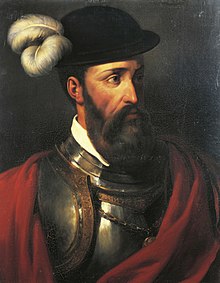Francisco Pizarro
Appearance

Francisco Pizarro González, Marquess of the Atabillos (c. 16 March 1478 – 26 June 1541) was a Spanish conquistador, best known for his expeditions that led to the Spanish conquest of Peru.
Quotes
[edit]- Friends and comrades! on that side are toil, hunger, nakedness, the drenching storm, desertion, and death; on this side, ease and pleasure. There lies Peru with its riches; here, Panamá, and its poverty. Choose, each man, what best becomes a brave Castilian. For my part, I go to the south.
- Speech to his followers before the expedition to Peru (1527), quoted in William H. Prescott, History of the Conquest of Peru With a Preliminary View of the Civilization of the Incas (1847; 1935), p. 125
Quotes about Francisco Pizarro
[edit]- Francisco Pizarro personifies the greed and callous inhumanity of the Spanish conquistadors who, in their quest for fame, money and empire, wantonly destroyed entire civilizations in the newly discovered lands of the Americas. Some went on to help rule this gold-rich empire, but many others lived the itinerant lifestyle of the military adventurer — ruthlessly exploiting native populations and extorting the wealth of the land to build vast private fortunes. Pizarro’s place in history is that of the man who destroyed the empire of the Incas and delivered much of the New World into Spanish hands.
- Simon Sebag Montefiore, Monsters: History's Most Evil Men and Women (2009), p. 130
- Pizarro died as he had lived. His readiness to kill in pursuit of wealth and power was the defining feature of his career. In the process he destroyed an ancient culture and opened up the South American continent to centuries of European exploitation: indeed, the crimes of the Spaniards who came in his wake arguably outweigh those of the man himself. Small wonder then that many Peruvians today regard him not as a hero, but as a criminal guilty of genocide.
- Simon Sebag Montefiore, Monsters: History's Most Evil Men and Women (2009), p. 133
- Pizarro's ruling motives, so far as they can be scanned by human judgment, were avarice and ambition. The good missionaries, indeed, followed in his train to scatter the seeds of spiritual truth, and the Spanish government, as usual, directed its beneficent legislation to the conversion of the natives. But the moving power with Pizarro and his followers was the lust of gold. This was the real stimulus to their toil, the price of perfidy, the true guerdon of their victories. This gave a base and mercenary character to their enterprise; and when we contrast the ferocious cupidity of the conquerors with the mild and inoffensive manners of the conquered, our sympathies, the sympathies even of the Spaniards, are necessarily thrown into the scale of the Indian.
- William H. Prescott, History of the Conquest of Peru With a Preliminary View of the Civilization of the Incas (1847; 1935), p. 341
- But, as no picture is without its lights, we must not, in justice to Pizarro, dwell exclusively on the darker features of his portrait. There was no one of her sons to whom Spain was under larger obligations for extent of empire; for his hand won for her the richest of the Indian jewels that once sparkled in her imperial diadem. When we contemplate the perils he braved, the sufferings he patiently endured, the incredible obstacles he overcame, the magnificent results he effected with his single arm, as it were, unaided by the government,—though neither a good, nor a great man in the highest sense of that term, it is impossible not to regard him as a very extraordinary one.
- William H. Prescott, History of the Conquest of Peru With a Preliminary View of the Civilization of the Incas (1847; 1935), pp. 341-342

